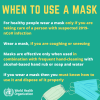Your position is misleading at best, and at worst ignorant of nature.
Fortunately, it isn't that hard for me to find examples that you can't add some random complexity too. Let's talk about temperature for example. Like all of my examples, it's perfectly relevant to the subject of the efficacy of masks. If a person overheats, their body is drained of the necessary water to keep them alive, and they die. The effects of heatstroke and lack of oxygen are most certainly an absolute of science. Conversely, when temperatures are too cold, life cannot survive.
With that said wearing a mask in the summertime especially while working, definitely seems risky. Now maybe you have never gotten heatstroke, but let me tell you something. You are absolutely going down for the count.
Yes you are right. If your body reaches a temperature which is too hot you can die - in theory. If your body becomes too cold you can die - in theory. No one is questioning that. The problem is that while that is the case, there is no absolute around it. There is no definitive set of circumstances which will cause a certain reaction and there may be a variety of reactions which will occur, but not everyone will react in the same way.
I’m sorry but that’s not me being argumentative. It’s just a fact. The best we can say as medical professionals is, in certain circumstances, this is what we might expect to see. It does not mean that we will see it in every circumstance.
I know you think my illness has no relevance here, but it has more relevance bullet proof glass and aluminium and steel.
I had a very bad bleed in my brain around the brain stem and into the cisterns of my brain. My family were warned of the possibly catastrophic outcome - more than possible, the likely. While it did change my life did change unrecognisably, It did not change in the way the extent of the haemorrhage suggested it was likely to. The woman in the bed opposite me was severely affected - could not talk, did not react to stimuli including touch, couldn’t really move more than one of her arms and mostly involuntarily, had a tracheostomy, was tube fed. She didn’t appear to recognise her family. She had had a craniotomy with the top of her skull tucked neatly into her tummy to keep the bone alive until it was ready to be replaced.
I had exactly the same bleed and the bleeding was in primarily the same sites. I have some cognitive impairment, and some mobility issues. However, I have more than a reasonable quality of life. There is no specific reason why her brain reacted differently to mine. After coiling, the same drug protocol was used for both of us and the same care pathway followed. She required further surgery. I did not.
There are expectations about how any illness may progress. Not everyone will react in the same way. Some will do better; some will do worse; others will die. 60% won’t make it to hospital alive; 50% of the remaining 40% will die in the first 20 days. There is no way of knowing exactly how the rest will recover. It varies greatly.
If you still don’t understand why I’m saying there are no absolutes in science and medicine, then I can’t make you understand. I keep adding random complexity because a) it’s not random complexity and b) the natural world is not within our control - and when we try to control it unnaturally, we don’t always get the results we expect.
We can only ever aim for the best results for the majority of people. We have to learn to expect the unexpected and we have to learn to anticipate it and deal with that. Sometimes that comes at a cost, which might not seem reasonable. In fact, in some instances it might not even be reasonable. Like in the scenario I describe above - everyone in the same hospital is treated with the same protocol. They are harsh drugs and some of them are administered 2 hrly, night and day, for 20 days. Some people will not develop the complication and therefore receive drugs they never would have needed. Others will receive the drugs and benefit from doing by preventing or limiting the complications. Others will take the and Will not benefit because they will develop the complications regardless, resulting in a poor outcome. There is no way of predicting for sure, whI have will react in exactly which way. The risk is equal for each patient but the outcome will not be the same. It is too late to wait until the complication develops to treat it. They have to try to prevent it - even though it might not work in every case.
The same can be said about Covid-19 to a certain extent. Certain people are seen as being more at risk of developing the condition. When it does develop however, there is no way of knowing with any certainty, how any individual will react. Therefore, everyone should be aware what the worst possible case scenario is. That’s not scare-mongering. It’s informing.
How does this not make sense? Where we might not know the exact risk, we have a moral duty not to leave it to chance.
Maybe it’s more complicated than that, in a country where healthcare is not free at the point of delivery. Maybe that’s what makes it more difficult to understand.





